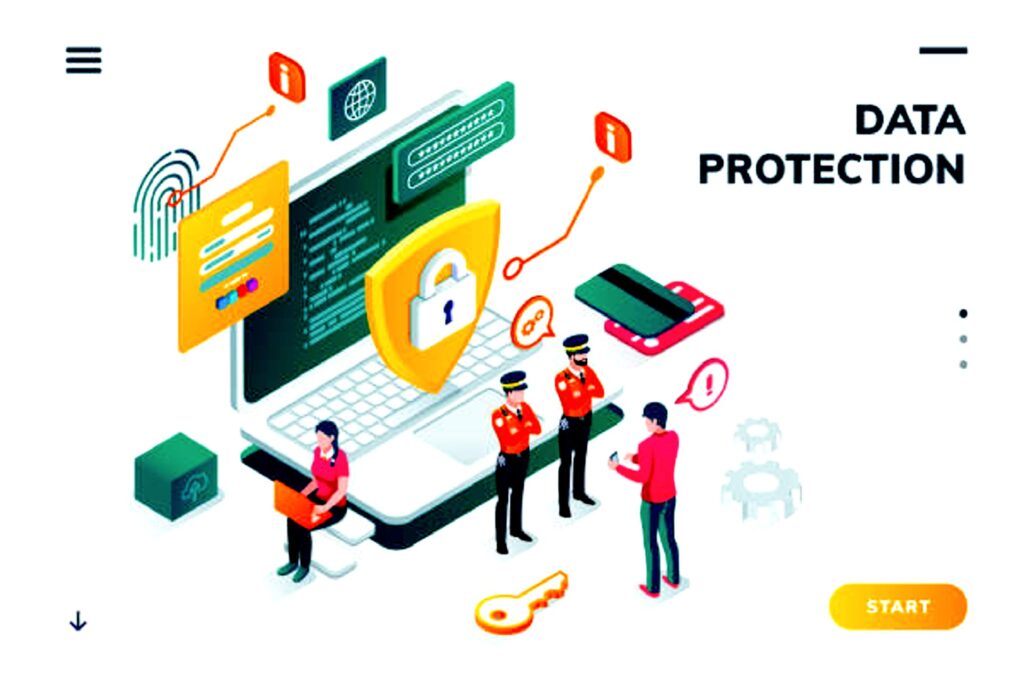Cybersecurity for businesses is a critical concern in today’s digital age. Protecting business assets is the bane for business leaders of all sizes. What could be done to mitigate against these business risks, vulnerabilities and cybersecurity threats? How is cyber security used in business?
As companies increasingly rely on technology for their operations, they also faced growing threats from cybercriminals. Protecting ones assets from these threats require careful planning.
A proactive and comprehensive cybersecurity strategy that addresses vulnerabilities across all aspects of your business is vital to success. This includes safeguarding sensitive data to implementing employee training programs.
Failure to prioritize cybersecurity can result in devastating consequences. This has made it imperative for businesses of all sizes to think fast and hard on ways to protect their assets.
Where these warnings were not heeded, it has also resulted in huge financial losses, damages to reputation, and loss of valuable data.
However, it is essential that businesses understand the importance of cyber security and take the necessary steps to protect themselves.
How does cyber security help businesses?
Why is cybersecurity important for businesses? Cybersecurity is a critical aspect of any modern business, as it helps to protect sensitive information, customer data, and business operations from malicious actors.
From small startups to large corporations, every business can benefit from taking the necessary steps to ensure its cybersecurity.
In this digital age, cyber threats are constantly evolving and becoming more sophisticated, so it’s important for businesses to stay ahead of the curve.
One of the main benefits of cyber security is the protection of sensitive information. This includes customer data such as names, addresses, and financial information, as well as confidential business information such as trade secrets and intellectual property.
By implementing strong security measures, businesses can ensure that this information is kept safe and secure, reducing the risk of data breaches and identity theft.
Another benefit of cyber security is the protection of business operations. Cyber attacks can disrupt business operations and cause significant financial losses.
For example, a ransomware attack can lock a company out of its own systems and data, preventing it from conducting business.
By taking proactive measures to secure its systems, a business can avoid these types of disruptions and minimize the risk of financial losses.
Investing in cyber security can also improve a business’s reputation and customer trust. When customers trust a business with their personal information, they expect that this information will be kept secure.
By demonstrating a commitment to cyber security and taking the necessary steps to protect customer data, a business can build trust and reputation with its customers.
In conclusion, cyber security is essential for businesses of all sizes in today’s digital age. From protecting sensitive information to improving reputation and customer trust, cyber security provides numerous benefits to businesses.
By taking the necessary steps to ensure their cybersecurity, businesses can stay ahead of the curve and protect themselves from malicious actors.
Understanding the Risks of Cyber Attacks
Cyber attacks can take many forms, including hacking, malware, phishing, and ransomware. These attacks can target businesses of all sizes, from small start-ups to large corporations.
Unfortunately, this can result in theft of sensitive information. For example, customer data and financial information, as well as disruption to business operations.
How do I keep my business cyber secure?
Cybersecurity is a critical aspect of any business operation. Especially in today’s digital age where cyber threats are on the rise. To ensure your business is protected from bad actors, here are some steps you can take:
Maintain Strong Passwords
Encouraging employees to use strong, unique passwords is a must for any business. Making sure passwords are at least 12 characters long, include a mix of uppercase and lowercase letters, numbers, and symbols, and are changed every 90 days can greatly improve security.
For instance, let’s have a strong password example using: “My email is encrypted” as a password. How best can I use these words to create a hard-to-crack password? Here’s my solution, “MY3m@iL1s3NcRyPt3d”. Here’s the benefit:
… a password that’s 18 characters in length … uses a mix of numbers, lowercase and uppercase letters, and symbols – could take up to 438 trillion years for the average hacker to crack, according to Hive Systems.
Awesome, isn’t it? Yes, if you can remember it at every login. If you keep resetting your password at every login the frustration might lead to having an easier one that could lead to brute force breach.
However, the key idea here is finding a balance between what you can remember is equally hard to crack and easy to remember with vulnerabilities. For example, if you were to use the strong password example above, you should take a screenshot of it for reference. That way you should eliminate the fear of forgetting it.
In addition, adding multi-factor authentication, such as a code sent to a mobile device, provides an extra layer of security. Regularly educating employees on the importance of strong passwords and how to create them can help create a culture of security within the company.
Anti-Virus Software
Installing anti-virus software on all devices and systems used by the business is crucial in preventing malware attacks.
Regular updates to the software ensure it remains effective against the latest threats. It’s also important to educate employees on the signs of a potential attack and how to report it to the appropriate personnel.
Having anti-virus software in place and regularly updated helps create a secure foundation for the business.
Software Updates
Regular software updates are essential in fixing known security weaknesses and improving the overall security of the business. Encouraging employees to keep their systems and software up-to-date can greatly reduce the risk of a potential vulnerability being exploited.
It’s also important to educate employees on the importance of regular software updates and how to initiate them. Regular software updates help keep the business ahead of potential threats.
Data Backup
Backing up data regularly protects against data loss in case of a cyber attack. Storing backups in a secure location, such as an off-site server or cloud storage, is essential.
Educating employees on the importance of data backup and how to do it can help ensure that all data is protected.
Having a solid data backup strategy in place can greatly reduce the risk of data loss and help the business recover quickly in the event of an attack.
Employee Training
Regular employee training in cybersecurity space is essential to preventing attacks and promoting a culture of security.
Educating employees on how to identify and prevent cyber threats, such as phishing scams and malware, can greatly reduce the risk of a successful attack.
Encouraging employees to report any suspicious activity can also help in detecting and preventing an attack. Regular employee training helps keep the business secure and creates a secure environment for all employees.
Access to Sensitive Information
Limiting access to sensitive information, such as financial data and personal information, is crucial in protecting the business.
Implementing a least privilege policy, where employees only have access to the information they need to do their job, can greatly reduce the risk of a data breach.
Regularly educating employees on the importance of protecting sensitive information and the consequences of a data breach can help create a secure environment. Controlling access to sensitive information helps protect the business and its customers.
Network Monitoring
What do you mean by network monitoring? In today’s world, businesses rely on technology to function, and network monitoring has become a crucial aspect of cybersecurity for businesses. As companies continue to grow and expand, they must ensure that their networks are secure and free of potential threats.
Network monitoring allows businesses to track their network traffic, identify suspicious activity, and take swift action to prevent data breaches and other cyber-attacks.
Regular network monitoring is essential to detecting and preventing cyber attacks. Monitoring for unusual activity, like unauthorized access or suspicious traffic, can help detect a potential attack.
Educating employees on the importance of network monitoring and how to report any unusual activity can also help in detecting and preventing an attack. In addition, your education should crafted to raise awareness and explore the importance of cybersecurity.
Enhancing your cybersecurity for businesses with some of the best practices can help your business safeguard its networks. Regular network monitoring can help create a secure environment for it.
Security Audits
Regular security audits are important in identifying and addressing any vulnerabilities in the business’s systems. Conducting regular security audits, both internally and by an external party, can help identify and address any potential weaknesses.
Educating employees on the importance of security audits and how they can contribute can help create a secure environment. Regular security audits help ensure that the business remains secure and protected.
Cybersecurity Expert
Hiring a cybersecurity expert, or dedicating an in-house team, can greatly improve the security of a business.
A cybersecurity expert can implement best practices, conduct regular security audits, and offer training and support to employees.
They can also stay up-to-date on the latest threats and provide a quick response in case of a security incident.
Having a dedicated cybersecurity team is a proactive business decision. It helps in detecting and preventing cyber attacks. They can help put a plan in place against security incident.
Legal Compliance
Staying compliant with relevant laws and regulations is vital to your survival. such as the General Data Protection Regulation (GDPR) and the Payment Card Industry Data Security Standard (PCI DSS), can help ensure that a business is protecting its customers’ information.
A cybersecurity expert can help a business stay compliant with these regulations and implement best practices for data protection. By staying compliant with relevant laws and regulations, a business can protect its customers and its own reputation.
By implementing these best practices and regularly educating employees on cyber security, your business can greatly reduce the risk of a successful cyber attack. Security is everyone’s business.
Creating a culture of security within your company can raise awareness among your employees. They become more aware of their actions and the importance of cyber security and taking the necessary steps to protect the business.
With the right tools and practices in place, a business can protect itself against cyber attacks and keep its customers’ information secure. To succeed you need willing hearts and co-operation from the right staff.
These steps will greatly reduce the risk of a cyber attack and keep your business secure. Remember, cybersecurity is a constant effort and requires ongoing attention to stay protected.
The Importance of Employee Education
One of the key ways to protect your business from cyber security threats is to educate your employees. Employees are often the first line of defense against cyber attacks.
Therefore, it is vital that they understand the dangers and know how to recognize and respond to potential threats.
This you can do through regular training and awareness programs, to give employees the tools and resources they need to stay safe online.
Lack of awareness among employees and human error is the principal reasons for sensitive data breaches. To control your information security
Implementing Strong Passwords and Multi-Factor Authentication
One of the simplest and most effective ways to improve your cyber security is by implementing strong passwords and multi-factor authentication.
Strong passwords should be long, complex, and unique, but not be used for multiple accounts. Multi-factor authentication adds an extra layer of security by requiring users to provide additional verification. For example, a code sent to your mobile phone or a fingerprint scan.
Having these extra layers of security can only strengthen your security posture and provide more layers of protection.
Regular Software Updates and Backups
Regular software updates are critical to keeping your systems and data secure. Software vendors regularly release updates that include security patches and improvements.
It is equally important to keep your software up to date to stay protected from latest threats.
Regular backups of your data are also essential to your business operations. This allows you to recover your data in the event of a cyber attack or system failure.
Working with a Cyber Security Expert
Working with a cyber security expert can help your business. This provides you with the expertise and guidance you need to stay protected from cyber security threats.
A cyber security expert can help you assess your current security measures. Apart from that, they can identify areas for improvement, and provide recommendations for best practices.
In addition, they can also assist with your implementation of new security measures. Allied to that, it provides ongoing monitoring and support to ensure that your systems remain secure.
What are the five 5 basic principles of cyber security?
Business operations demand structures, standards, order, routines and general acceptances. However, there is no better place for these principles than in cybersecurity. The fundamental tenets of cybersecurity for businesses operations are: confidentiality, integrity, availability, accountability, and non-repudiation.. Together they formed the backbone of a robust cybersecurity strategy.
Confidentiality
What is confidentiality in CIA triad? This refers to protecting sensitive information from unauthorized access. Confidentiality ensures that sensitive information, such as customer data and business secrets, are kept private and can only be accessible by authorized persons. It is a vital part of confidentiality, Integrity and availability, CIA Triad structure. It forms the cornerstone of any secure data protection.
In today’s digital age, data breaches and unauthorized access to sensitive information are prevalent. Therefore, businesses must take all necessary steps to safeguard their data from malicious actors.
Confidentiality involves protecting information from unauthorized access. It ensures that sensitive data is only accessible to authorized users. For example, no business leader would want their intellectual properties in the hands of their competitors. Will they?
Confidentiality allow businesses to implement various measures like access controls, encryption, and user training to keep their data secured.
To maintain cybersecurity for business, a deeper understanding of the importance of confidentiality in the CIA triad is required. Exploring some practical measures that your business can take to ensure data confidentiality will only enhance your security.
Integrity
Integrity deals with data accuracy and consistency. It ensures that data is not altered or corrupted in any way and that it remains in its original state. This helps to maintain the trustworthiness and reliability of the data.
It is a fundamental to cybersecurity for businesses operations. Beside these attributes, it encompasses the accuracy, completeness, and trustworthiness of information. Maintaining data integrity is critical to prevent unauthorized modification, corruption, or destruction of data by malicious actors.
Inaccurate or corrupt data can lead to significant operational, financial, and reputational damage for businesses.
Therefore, organizations must take all necessary steps to ensure data integrity, including implementing access controls, data backups, and using digital signatures.
Data integrity is integral to businesses authenticity and should take all necessary measures to ensure that their data remains accurate, reliable, and trustworthy.
Availability
Availability refers to the accessibility of information and systems. It ensures that authorized individuals can access the information and systems as needed and when they need it. This helps to maintain business operations and minimize downtime.
Authenticity
Authenticity validates identity of people and systems. It helps to ensure that only authorized people have access to sensitive information and systems. Apart from validation it also helps to reduce risk of cyber attacks.
Non-Repudiation
This principle refers to the proof of the authenticity of a transaction. Non-repudiation ensures that transactions cannot be disputed or denied and that the parties involved in a transaction can be held accountable for their actions.
It is a property of a system or protocol that ensures that a party cannot deny or refute their own actions or communications. This means that if a party sends a message or performs an action, they cannot later claim that they did not do so.
Non-repudiation is typically achieved through the use of digital signatures. which provide strong evidence of the origin, integrity, and authenticity of a message or transaction. It is important in situations where it is critical to establish the identity of the sender or the integrity of the message. For example, in legal or financial transactions.
Overall, these five principles form the tenet of all cybersecurity operations. They are critical for protecting sensitive information, systems, and business operations from cyber attacks.
When you implement these strong security measures and follow after these principles, your businesses will greatly reduce the risk of a successful cyber attack. This can help you maintain the principles of security triads. These are: confidentiality, integrity, and availability of their information and systems.
What are the 5 benefits of using cybersecurity?
Cybersecurity for businesses is essential in today’s digital age, where businesses rely heavily on technology for their daily operations. While cybersecurity measures may require time, effort, and resources to implement, they offer significant benefits to businesses in the long term. Below are some benefits you can explore for business and why they are crucial in today’s business landscape.
cybersecurity gives you protection for business
The first benefit of cybersecurity for businesses is protecting sensitive data. What is the best way to protect business? Cyber criminals and hackers are continually looking for ways to steal confidential business data.
For example, financial records, customers data, and proprietary information. Do you just hand it to them? Of course not. This is why companies invest in tools that enable cybersecurity detection and protection.
Implementing cybersecurity measures like firewalls, antivirus software, and encryption can help businesses protect their sensitive assets from cyber criminals.
Helps Maintain Business Continuity
A good cybersecurity benefits business continuity. It maintains and sustains businesses even in the face of attacks. Cyber attacks like ransomware and denial of service (DoS) attacks can disrupt business operations.
This can result in significant financial losses and reputational damage. However, you can have cybersecurity measures like disaster recovery plans and backup systems in place. This contingency plans can help your business recover from cyber attacks quickly and ensure business continuity.
Cybersecurity Ensures Compliance to Standards
The third benefit of cybersecurity for businesses is compliance with regulatory requirements. Many industries have regulatory requirements for cybersecurity. For example, ISO 27001/27002 frameworks and the Health Insurance Portability and Accountability Act (HIPAA) in the healthcare industry. Compliance with these regulations is essential for avoiding costly fines and legal action.
Builds Customer Trusts
Having a good cybersecurity posture for your business is great for building customers’ trust. With the increasing frequency of high-profile cyber attacks and data breaches, customers are becoming more of their vulnerabilities.
They are equally concerned about the security of their personal data. For example, if you know a company who frequently being hacked, would you buy from them? Probably not.
Why is it important to build trust with customers? Trust is not an easy commodity to come by in business. When you make conscientious efforts to build trust the reward is always long-term, especially with cybersecurity.
Therefore, implementing robust cybersecurity measures can help businesses build trust with their customers, and thus demonstrating their data security credentials.
Cybersecurity gives you competitive edge
Businesses with a strong cybersecurity strategy are more likely to win contracts and partnerships with other businesses. They are seen as reliable partners who take data security seriously and are less likely to experience data breaches.
Businesses that prioritize cybersecurity and implement robust cybersecurity measures can differentiate themselves from their competitors.
By investing in cybersecurity, businesses can demonstrate to customers and partners that they take data security seriously. This enhances their reputation and build trust, which is crucial in today’s business landscape.
Having a competitive edge in today’s business world, increases the bottom-line. As businesses are increasingly relying on technology, having the right setup gives you a competitive advantage. With that comes the need for cybersecurity and its headaches.
However, a strong cybersecurity strategy can help your business identify and respond to cyber threats quicker. This means, you can recover from cyber attacks a lot quicker and resume normal operations faster than your competitors. That can give you an edge in your industry and help you stay ahead of the competition.
Moreover, many industries now require cybersecurity compliance for vendors and partners. This means that businesses that do not have a robust cybersecurity strategy may be unable to work with other businesses that require cybersecurity compliance. This can significantly limit their opportunities and put them at a disadvantage.
Nevertheless, the benefits of cybersecurity for businesses are numerous. The importance of cybersecurity is only expected to increase as businesses continue to rely more on technology.
Investing in cybersecurity measures can help businesses protect their sensitive data and maintain business continuity. It also helps to comply with regulatory requirements, and build customer trust.
Your Takeaway
Cybersecurity for businesses is an essential concern for businesses of all sizes. It is no longer just an option but a necessity. A successful cyber-attack can have devastating consequences. This can lead to reputational damage, financial losses, and legal consequences. As organizations continue to adopt new technologies and work remotely, the threat landscape will continue to grow. Therefore, businesses must stay at alert and keep their cybersecurity measures up to date to avoid potential breaches. By ensuring the best practices outlined above, your business could minimize its risk of cyber-attacks and protect your assets from harm.




